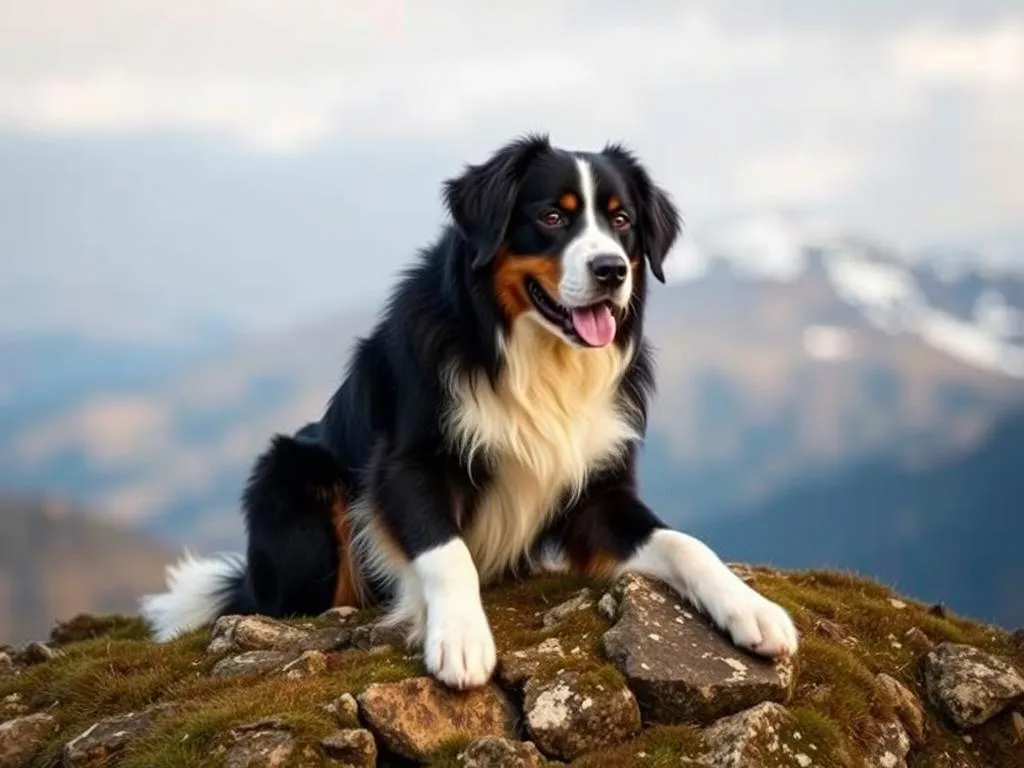
Introduction
The Bernese Mountain Dog is a captivating breed known for its striking appearance and gentle temperament. Originating from the picturesque landscapes of Switzerland, this large working dog has garnered immense popularity worldwide due to its affectionate nature and versatility. Understanding specific dog breeds, such as the Bernese Mountain Dog, is crucial for potential owners, as it allows them to meet their needs and expectations. This article aims to provide comprehensive facts about Bernese Mountain Dogs, from their history and physical characteristics to health considerations and fun quirks.
History and Origins
Historical Background
The roots of the Bernese Mountain Dog can be traced back to the Swiss Alps, where they were initially bred as versatile farm workers. These dogs were primarily used for herding cattle, pulling carts, and serving as loyal companions to farmers. Their ability to adapt to challenging terrains and harsh weather conditions made them invaluable to Swiss agriculture. Over the years, the breed evolved, gaining recognition for its strength, intelligence, and unique appearance.
Breed Recognition
The Bernese Mountain Dog is recognized by major kennel clubs, including the American Kennel Club (AKC) and the United Kennel Club (UKC). These organizations establish breed standards that outline the ideal physical and behavioral traits of the breed. Such recognition is essential, as it helps maintain the integrity of the breed and informs potential owners about the characteristics to expect.
Physical Characteristics
Size and Weight
Bernese Mountain Dogs are classified as a large breed. On average, male Bernese Mountain Dogs stand between 25 to 27 inches tall and weigh between 80 to 115 pounds. Females are slightly smaller, typically measuring 23 to 26 inches in height and weighing between 70 to 95 pounds. When compared to other large breeds, such as the Golden Retriever or Rottweiler, the Bernese Mountain Dog is notably heavier and has a more robust build.
Coat and Color
One of the most striking features of the Bernese Mountain Dog is its beautiful tricolor coat, which consists of black, white, and rust colors. The breed has a long, thick double coat that provides insulation against cold weather. Grooming is essential for maintaining the coat’s health; regular brushing is recommended to manage shedding and prevent matting. During shedding seasons, owners may need to groom their dogs more frequently to keep their coat in optimal condition.
Distinctive Features
Bernese Mountain Dogs are known for their distinct facial features, including expressive brown eyes and a gentle, kind expression. Their ears are medium-sized, hanging close to the head, and their build is sturdy with a strong, muscular frame. Compared to other mountain dog breeds, such as the St. Bernard or the Swiss Mountain Dog, the Bernese Mountain Dog tends to have a more agile appearance, making it well-suited for various activities.
Temperament and Behavior
General Temperament
The Bernese Mountain Dog is famous for its affectionate and gentle nature. These dogs are known to be loyal, easygoing, and particularly good with children, making them excellent family pets. They thrive on human companionship and are known to form strong bonds with their families. Their calm demeanor, coupled with their playful side, makes them a joy to have around.
Socialization and Interaction
Early socialization is crucial for Bernese Mountain Dogs to ensure they develop into well-adjusted adults. Exposing them to various environments, people, and other pets during the puppy stage helps them become more adaptable and confident. They generally get along well with children and other animals, but supervision during playtime is always recommended. Some Bernese Mountain Dogs may exhibit protective instincts, particularly towards their families, which is something to consider for potential owners.
Training and Intelligence
Bernese Mountain Dogs are intelligent and eager to please, which makes them relatively easy to train. Positive reinforcement methods, such as treats and praise, work best for this breed. However, consistency and patience are essential, as they can be a bit stubborn at times. Common challenges in training may include their tendency to be distracted or to test boundaries, particularly if they are not adequately stimulated both mentally and physically.
Health and Lifespan
Common Health Issues
Like many breeds, Bernese Mountain Dogs are predisposed to certain genetic health issues. Common concerns include hip dysplasia, elbow dysplasia, and specific types of cancer, including histiocytic sarcoma. Regular veterinary check-ups and screenings are essential to catch any potential health problems early. Responsible breeding practices also play a significant role in reducing the incidence of these conditions.
Lifespan and Care
The average lifespan of a Bernese Mountain Dog ranges from 7 to 10 years. Factors such as genetics, diet, healthcare, and exercise significantly impact their longevity. A balanced diet rich in high-quality protein and essential nutrients, combined with regular exercise, can help maintain their overall health and well-being.
Preventative Care
Preventative care is vital for the health of Bernese Mountain Dogs. Recommended vaccinations include those for rabies, distemper, parvovirus, and kennel cough. Regular health screenings, including hip and elbow evaluations, can help detect issues early. A proper diet and exercise regime will also contribute to their overall health, reducing the risk of obesity-related problems.
Living with a Bernese Mountain Dog
Ideal Living Conditions
Bernese Mountain Dogs require ample space to thrive, making them more suitable for homes with yards than for apartments. They enjoy being outdoors and need room to roam and play. However, they can adapt to different living situations if their exercise and socialization needs are met. A secure, fenced yard is ideal to keep them safe while allowing them to enjoy the great outdoors.
Exercise Needs
Daily exercise is crucial for the health and happiness of Bernese Mountain Dogs. They require at least 30 to 60 minutes of physical activity each day. Activities such as hiking, walking, and playing fetch are excellent for keeping them physically fit and mentally stimulated. Engaging in interactive games can also help prevent boredom and destructive behaviors.
Grooming and Maintenance
Maintaining the coat of a Bernese Mountain Dog requires regular grooming. It is recommended to brush their fur at least once a week to manage shedding and prevent matting. During seasonal shedding periods, more frequent grooming may be necessary. Bathing should be done as needed, but over-bathing can strip their coat of natural oils. Additionally, regular checks of their ears, teeth, and nails are essential to maintain overall health.
Fun Facts About Bernese Mountain Dogs
Unique Traits and Behaviors
The Bernese Mountain Dog has several fun and unique traits that endear them to their owners. They are known for their expressive faces and are often referred to as “gentle giants” due to their size and temperament. Many Bernese Mountain Dogs enjoy participating in dog sports, such as carting and agility, showcasing their intelligence and athleticism. In pop culture, they have made appearances in films and television, reinforcing their reputation as loyal and loving companions.
Comparison with Other Breeds
When comparing the Bernese Mountain Dog to other breeds, it stands out for its stunning tricolor coat and calm demeanor. Unlike the more energetic Border Collie or the protective Rottweiler, the Bernese Mountain Dog offers a more laid-back approach while still being an excellent working dog. Their unique combination of strength, loyalty, and gentleness makes them a distinct choice among large breeds.
Conclusion
In summary, the Bernese Mountain Dog is a remarkable breed with a rich history and a loving temperament. From their physical characteristics to their health considerations, these dogs require dedicated care and attention. Their affectionate nature makes them excellent companions for families and individuals alike. As potential owners consider bringing a Bernese Mountain Dog into their home, it is essential to understand their unique traits and needs to ensure a harmonious and fulfilling relationship.
By appreciating the facts about Bernese Mountain Dogs, prospective owners can make informed decisions that align with their lifestyles and the breed’s requirements. Ultimately, the Bernese Mountain Dog can be a loyal and loving addition to any family, bringing joy and companionship for years to come.









